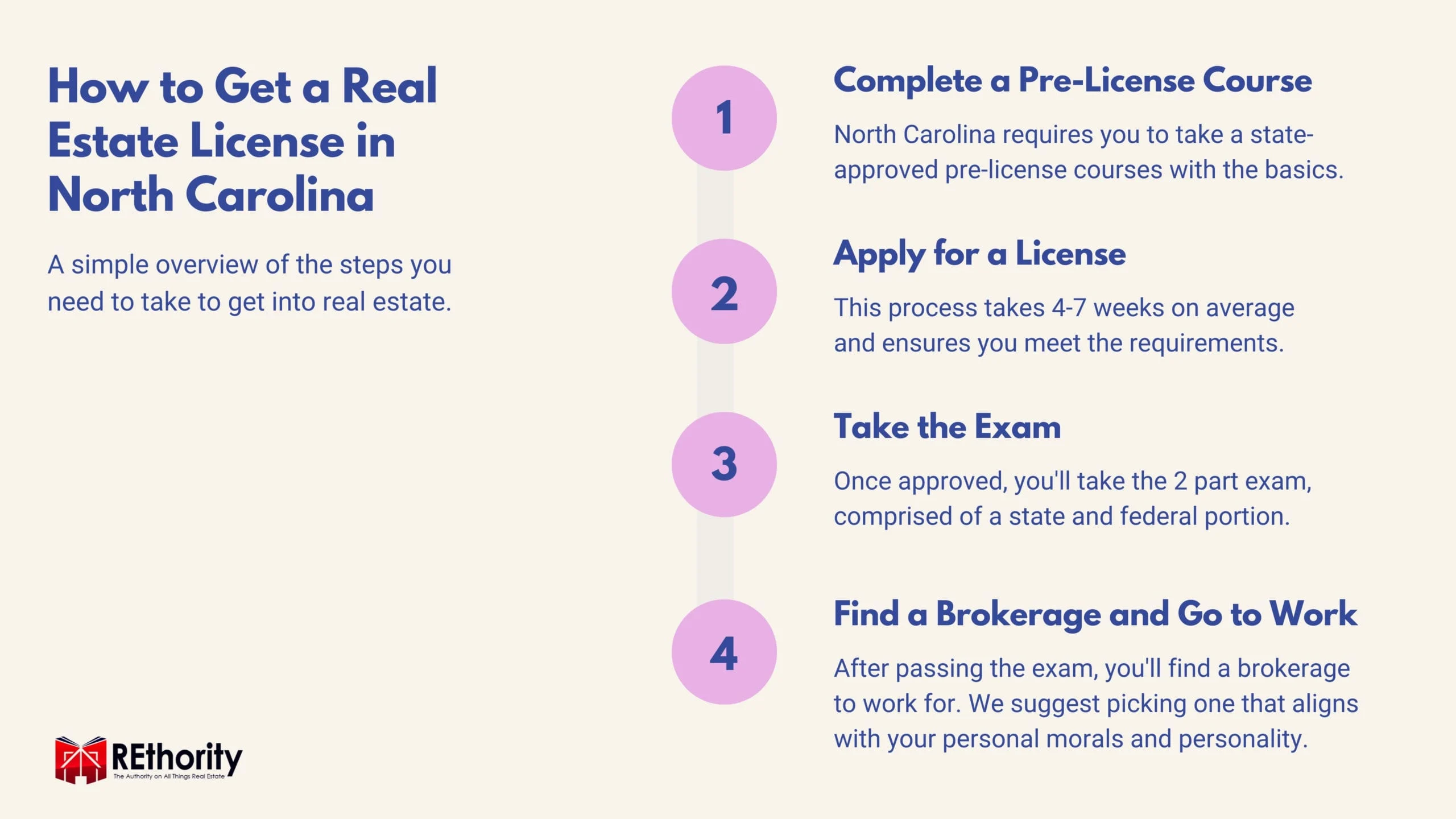Thinking about getting your real estate license in North Carolina?
We’ll cover everything you need to know, including requirements, the exam, and the best brokerages to work for.
Read on to learn how to get a real estate license in North Carolina.
Why Consider Getting a North Carolina Real Estate License
North Carolina is a beautiful state with lots of natural charm and something for everyone, from laid-back coastal living to Blue Ridge mountain views. It’s the birthplace of nationwide companies like Pepsi and Krispy Kreme.
It’s also the site of the historic Wright Brothers’ first flight. As the state’s population grows at an above-average rate, it’s quickly becoming one of the most promising places to begin a real estate career.
Real estate agents and brokers working in the state make an average of $59,920 per year, which is $17,420 more than the nationwide average of $42,500.
If you want to get a real estate license in North Carolina, there are some special considerations to take into account and a few rules and requirements you have to meet to be eligible. We’ll go over what licensed real estate professionals do in North Carolina.
We also cover the types and statuses of real estate licenses available, the pre-licensing and post-licensing requirements all individuals have to meet, and what’s changing about the state’s real estate market in this guide.
First, let’s get to know the Tar Heel State a little better to see why it’s a great place to work as a real estate professional. Make sure to read the entire article and take our short quiz at the end! We’ll make sure you’ll thank us when you’re done. Let’s dive in.
About North Carolina

Markvandykephotography/Shutterstock
North Carolina is the 10th most populous state in the nation, with a total population of 10.61 million. It is considered a “sticky state,” meaning its residents tend to stay in the state for the duration of their lives.
Rebecca Tippett, director of Carolina Demography at the UNC-Chapel Hill Carolina Population Center, says,
“Only Texas has a higher share of native-born adults who are still living in the state. North Carolina is what we consider both a sticky state and a magnet state. So we’re appealing to lots of people for lots of different reasons.”
With loyal residents that stick around for life and contribute to a fast-growing population, North Carolina has all the makings of a hot real estate market. Let’s look at what the housing market is like in the state right now.
The North Carolina Real Estate Market
The median value of a home in North Carolina—what the home is worth—is $204,311. That value is up 5.1% from last year, and it’s expected to increase by another 4.2% by 2021.
The median list price for a home here is higher than the median home value at $217,400, but some listing prices are reduced to sell. More than 63% of North Carolina residents own their homes.
- Median Home Value: $204,311
- Median Price per Square Foot: $136/sq. ft.
- Median Home Price: $217,400
- Median Rent Price $1,395
Average home values in North Carolina appreciated by almost 6% last year, which is in line with the average appreciation rates across the country. Totaling the appreciation rates every quarter since 2015, home values appreciated about 12% on average, compared to the nationwide average of 5.86%.
What’s driving the housing market here? Two important factors are the shortage of homes for sale and the rising demand that accompanies it. Median home values vary based on the home’s location. Cary, the 7th-largest city in the state, has the state’s highest home values.
Fayetteville, the 5th-largest city in the state, has the state’s lowest home values. Here’s a look at median home values in the different metropolitan areas in North Carolina.

Alexlinck/Shutterstock
Average Home Values By City (NC)
- Cary – $336,400
- Raleigh – $221,100
- Wilmington – $196,300
- Durham – $185,100
- Charlotte – $183,800
- Concord – $170,900
- Greensboro – $128,500
- Winston-Salem – $124,200
- Fayetteville – $111,100
North Carolina Population Growth
North Carolina’s population is booming. It is home to more than 10.61 million people and is the 10th most populous state in the United States. Compared to the 2010 population of 9,535,483, the fast growth rate of 1.13% makes it the 14th-fastest-growing state in the country.
Most of the population growth is concentrated in specific areas of the state. Growing counties include Brunswick County (130,897 people), Mecklenberg County (1,093,901 people), and Wake County (1,092,305 people).
Brunswick County boasts an impressive 27% growth rate over the last decade. These fast-growing counties would be great places to start your real estate career. Some counties in North Carolina are shrinking (mostly rural areas).
They include Edgecombe County, Halifax County, and Washington County. Each of these counties has an average decrease of 8% over the last decade, making them a bit unattractive to begin a real estate career in.
With a better understanding of the housing market in North Carolina, let’s talk about how to get a real estate license in this state. The licensing agency is the North Carolina Real Estate Commission.
The North Carolina Real Estate Commission (NCREC)
The North Carolina Real Estate Commission is an independent government agency in the state of North Carolina.
It exists to issue real estate licenses and regulate licensed individuals in the state. The NCREC currently has more than 80,000 licensed real estate professionals.
The North Carolina Real Estate Commission uses a “broker-only” real estate licensing system, meaning every real estate professional who holds a license here is licensed as a broker.
There are several categories of broker licenses in the state, however. We’ll go over those in detail below.
What Does a Broker Do?
Brokers are similar to real estate agents, with a few crucial distinctions. Brokers can sell homes just like real estate agents, but they also have additional abilities.
Brokers are responsible for maintaining trust and escrow accounts, retaining client and property records, and supervising provisional brokers or real estate salespersons.
They also ensure all brokers within their firm or brokerage follow NCREC rules and disclosure requirements. In North Carolina, every licensed real estate professional is a broker, but not every broker has “full” broker status.
We’ll talk about that below as we look at the different types of broker licenses available in North Carolina
Types of North Carolina Real Estate Licenses
There are several types or categories of broker licenses in the state of North Carolina. Below, we’ve listed the different license levels or categories.
- Provisional Broker (Entry-level license): A broker license is on provisional status, meaning the broker must be under the supervision of a licensed broker-in-charge (BIC)
- Broker: The primary, non-provisional broker license issued after a provisional broker completes all post-licensing requirements. A broker license allows you to work as an affiliated agent at a brokerage under a broker-in-charge or work independently as a sole proprietor
- BIC Eligible: Broker license granted to a real estate professional with a broker license who has met all BIC eligible requirements, submitted the proper request form, and completed a 12-hour BIC course
- Broker-In-Charge: Once a broker has BIC-eligible status, they can become licensed as a true Broker-in-Charge (BIC). A BIC is required at every real estate firm or sole proprietorship. This license status allows them to supervise all brokers working within a brokerage.
- Firm: A broker license issued to a business, not an individual.
- Limited Nonresident Commercial Broker: A broker license issued to an out-of-state, actively licensed broker or real estate agent who will be involved in a commercial real estate transaction within the state
If you decide to get your real estate license in North Carolina, you’ll start with a Provisional Broker license and work under a licensed Broker-in-Charge (BIC).
If you choose to upgrade your license to a Broker license or a BIC license, you’ll need additional licensing education, courses, and time in the field. Let’s look at the requirements for each license type.
How to Get a Real Estate License in North Carolina
Just like any other state, there are a few steps that you need to take in order to get a real estate license in North Carolina. We’ll dive into more detail later on, but we made a simple chart to help you quickly understand the basics.

However, before you can even apply, you’ll need to meet a few basic requirements. These are put in place to ensure that only brokers and agents who are morally upstanding and ethical are representing clients.
North Carolina Real Estate License Requirements
To qualify for a real estate license in the state of North Carolina, you must:
- Be 18 years old or older
- Be a U.S. citizen , a non-citizen national, a qualified alien under federal law, or have a lawful presence in the U.S. and be authorized to work in the U.S. in the real estate brokerage field
- Have a valid Social Security Number (SSN)
- Fulfill at least one of the required Education Qualification Options below
- Order a Criminal Record Check within six months before applying for your license
- Apply and pay the application fee
- Pass a 2-part real estate license exam
- Complete 90 hours of post-licensing education to activate your license
Step One: Complete Your Pre-Licensing Education
Before you can apply for your North Carolina broker license, you’ll need to satisfy the education requirement. You have a few ways you can do this, depending on your previous real estate education.
Education Qualification Options
The NCREC gives you four options to satisfy the education requirement to get your real estate license.
- Option 1: Complete the 75-hour North Carolina Broker Prelicensing Course at a Commission-approved school. In North Carolina, you have to take your pre-licensing education courses in a live classroom setting or through one of the approved Distance Learning schools.
- Option 2: Complete an equivalent real estate salesperson pre-licensing course in another state. You must have at least 75 hours of course credit, and the course must have been completed no more than one year before license application.
- Option 3: Show proof of “substantial real estate education” other than pre-licensing courses (for example, college courses on real estate topics). You must have a Bachelor’s or higher degree in real estate fields or a law degree to use this option.
- Option 4: Currently hold an active real estate license in another state, U.S. territory, or Canadian province. You must either submit an application, criminal record, license certification, and application fee, pass the North Carolina portion of the 2-part license exam, and start with a provisional or full broker license (depending on the type of current license you hold).
OR submit an application, criminal record, license certification, and application fee, and be issued a provisional pr full broker license with the requirement to complete the post-licensing education afterward.
Step Two: Apply For Your Broker License
Once you’ve met the initial requirements and completed your required education (75-hour pre-licensing course or one of the other three options), you are eligible to apply for your broker license.
You’ll want to apply for your broker license and take the exam as soon after finishing your required education as possible, so the information is fresh in your mind. Here’s how to do it.
- Complete and submit your license application with any required documents, and pay the non-refundable application fee of $100.00.
- The Commission will review and process your application
- Once approved, you will receive a Notice of Exam Eligibility in 2–3 business days via email or post
- Contact the PSI LLC testing service (more information is included in your Notice of Exam Eligibility) and pay the exam fee of $64.00 to make an appointment to take your real estate license exam
Step Three: Take the Licensing Exam
To make an appointment to take your licensing exam, you can visit www.psiexams.com or call 800-733-9267 Monday through Friday from 7:30 a.m. to 10:00 p.m. and weekends from 9:00 a.m. to 5:30 p.m. Eastern time.
You will be required to pay the $64.00 exam fee when you register. On the day of the exam, you need to bring two forms of acceptable identification to enter the testing facility. You must bring a form of primary ID and a secondary ID.
- Driver’s license
- Learner’s permit
- National, state, or country ID card
- Passport
- Military ID
- Alien Registration Card
- Credit or debit card with your signature
- Social security card
- Additional primary ID form
Once you have checked in and verified your identity, you will take the exam. You will be presented with a series of multiple-choice questions that are issued at a computer. The exam is divided into two sections: The National and State sections.
The National section contains 80 questions that are on every real estate licensing exam, and you’ll get 2 hours to complete it. The state section contains 40 questions that are developed by the NCREC.
There are a total of 120 multiple-choice questions on the exam, and you’ll get 1 ½ hours to complete it. To pass the exam and obtain your North Carolina license, you have to obtain at least the minimum passing score.
- National Section: At least 57/80 questions are correct
- State Section: At least 29/40 questions are correct
If you pass the exam, your Provisional Broker license will be issued to you in the mail within 7–10 business days. If you fail the exam, you can reschedule and take it again. You will have to pay the application fee and exam fee again each time you retake the exam.
Step Four: Activate Your License
When you are issued your provisional broker license, it will be inactive at first. You must activate your license by filling out a License Activation/Affiliation form and submitting it to the Commission office. You can complete the form online.
To complete the form and activate your license, you need to find a Broker-in-Charge (BIC) to work under and be supervised by. To terminate the provisional status on your license, you have to complete 90 hours of required post-licensing education.
Post-Licensing Education Requirements
All provisional brokers are required to take 90 hours of post-licensing education in the state of North Carolina to activate their license. Post-licensing education is divided into three courses:
- Broker Relationships and Responsibilities
- Contracts and Closing
- License Law, Commission Rules, and Legal Concepts
Once you’ve completed these three courses, your license will be activated, and your provisional status is terminated. This makes your license a full Broker license.
Step Five: Find Your Brokerage
Once you’ve been issued a provisional or full broker license in North Carolina, you must find a licensed Broker-in-Charge (BIC) to work under. This is not a decision you should take lightly.
The brokerage you choose will determine how much additional training you get, how many clients you are able to work with, and how much commission you’ll take home from each sale.
Some brokerages charge additional fees to the brokers working there, including desk fees and franchise fees. In some cases, paying more in fees while taking home a larger commission may be worth it.
In other cases, you may want to take a smaller commission in exchange for not paying desk and franchise fees. Choosing a brokerage is something you should heavily research and take your time deciding.
Here are some ideas of the most highly-rated brokerages to work for in North Carolina to get you started.
Best North Carolina Brokerages to Work For
Consider fees, work environment, professional development options, company culture, market share, and Commission splits when choosing your brokerage. Here are some of the top-rated brokerages to work for.
There is also a huge variety of national brokerage franchises that operate across the state of North Carolina. Consider Keller Williams, Century 21, Sotheby’s, RE/MAX, Coldwell Banker, and Realty ONE Group.
Local “boutique” brokerages might be best if you’re looking for lower or nonexistent desk and franchise fees and a higher commission split.
Local brokerages may see a lower sales volume. National franchises may be the better option if you’re hoping for additional training and professional development at the expense of lower commission splits and other fees.
Should You Get Your North Carolina Real Estate License?
After reading about how to get your real estate license in North Carolina, how do you feel about the concept? It takes some work and planning to make it happen, but it’s a straightforward process that anyone with the required education and drive can accomplish.
Let’s recap. Make sure you:
- Meet the initial requirements to apply for the license
- Sign up for your 75-hour pre-licensing course
- Pass the course
- Submit your license application and fee
- Register and pay for your exam
- Pass the exam
- And finish your post-licensing education (90 hours)
Finally, find a broker-in-charge to work under. Then you’ll be ready to start selling homes in North Carolina and start your real estate career in this gorgeous, diverse state.
Of course, we always suggest the most flexible option for obtaining your pre-license requirements. Our preferred vendor is Real Estate Express. Want to learn more? Read our full product review today.

